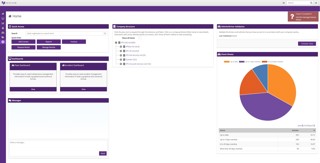Health and safety lawyer Michael Appleby says many companies are compliant with work-related road safety legislation, but are failing to effectively manage vehicles, drivers and journeys on a day-to-day basis.
Appleby, of London-based law firm Fisher Scoggins Waters, warned fleet decision-makers at the inaugural meeting of Fleet Service Great Britain’s Achieve Driver Management User Group (pictured).
Achieve is the company’s umbrella brand with a range of components, including Achieve Driver Management, Achieve Crash Management and Achieve Maintenance Management.
Fleet decision-makers are able to ‘pick ‘n’ mix the tools in the Achieve box to provide their businesses with data to further improve vehicle, driver and journey management.
The Driver Management User Group is focused on providing support, advice and mentoring on all aspects of managing drivers, vehicles and journeys, by sharing knowledge and best practice to influence behind-the-wheel behaviour and performance thus ensuring a safe working environment. Furthermore, fleet decision-makers in the User Group will provide input into the future development of new Achieve Driver Management features.
Appleby, highlighted that many organisations went through the compliance ‘tick box procedure’ of, for example, checking the validity of employees’ driving licences and encouraging defect checks to be undertaken, but failed to translate the information gathered into practical management.
“There is a correlation between ‘bent metal’ crashes and proper management,” he said. “Companies may have really good health and safety management across their core business, but when it comes to vehicles and drivers it can be much weaker.
“Too many companies view road risk as managing compliance and not managing the risk itself. Employers should have the basic elements of managing safety in place, but frequently there is very little actual day-to-day management. When ‘things go wrong’ businesses could be massively exposed because they do not have the answers to questions posed by investigators.”
Business journey crashes - either in a company-provided vehicle or an employee’s own vehicle - could be investigated by the police or Health and Safety Executive while coroners, in the event of a fatality, may also be influential.
Appleby highlighted how coroners now had a statutory duty to consider writing a Prevention of Future Deaths Report to any organisation or person where they believed action should be taken to prevent future deaths.
“Coroners have a wide discretion as to the scope of an inquest," he said. "I can foresee the situation where there is a fatality in a work-related road crash and a coroner wants to enquire how a business is managing its vehicles and how data is being used to manage the fleet and drivers.”






















Login to comment
Comments
No comments have been made yet.